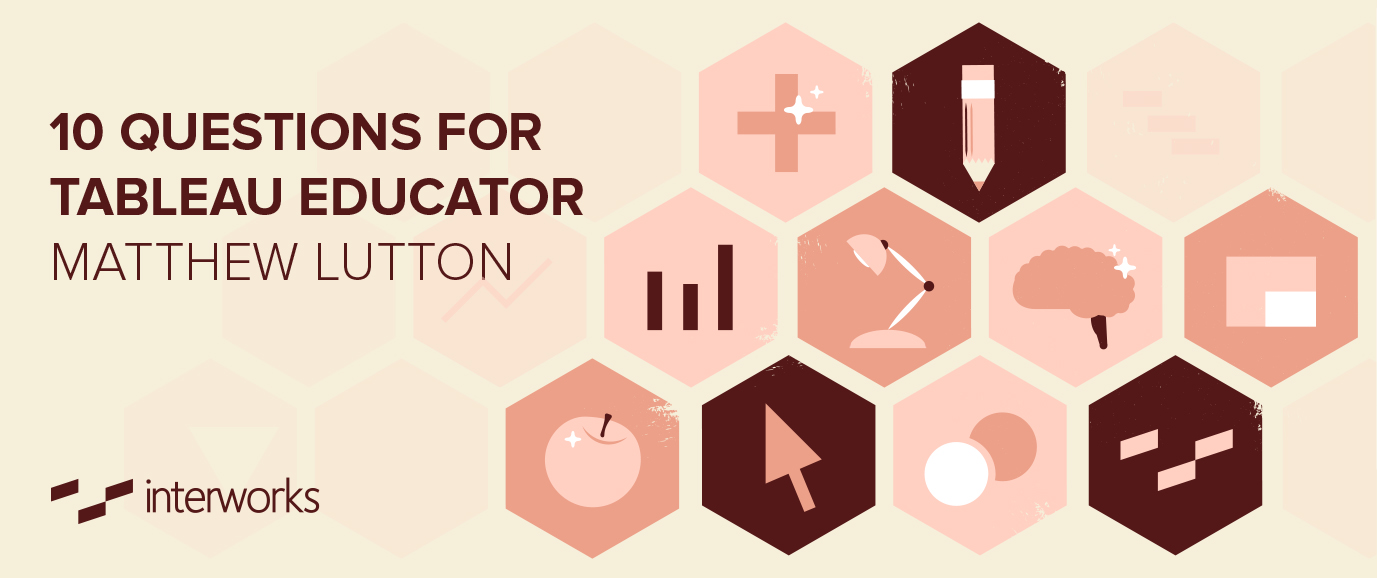10 Questions is an ongoing blog series in which Tableau Zen Master Dan Murray interviews some of the brightest folks in the world of data.

Matthew is relatively new to the Tableau world (with a little over two years in the Tableau sphere) and I have to admit, I didn’t know about him and didn’t meet him until the annual Tableau Conference last year in Seattle. Like a bullet, he came out of nowhere and made a mark. We do have something in common besides Tableau and Zen Master status. Both of us come from Miami County, Indiana. Home of big cities like Peru, Bunker Hill, Denver, Amboy, Macy, Converse and the big city of Tin Cup. The last time I peddled through Tin Cup, the town sign said “Population 14” (a “15” had a big X marked through it). The entire county only has an estimated 36,140 people according to the latest Wikipedia entry. I went to high school in Peru, Indiana (Circus City). Aside from that, I know Matthew likes the Apple Watch. We spent some time sharing heartbeats and taps a month or so back.
The Questions
Q: Well, Matthew, exactly where did you live in Miami County? On a farm?
Lutton: I grew up in Peru, Indiana, for the majority of my childhood. I lived in a small house on the edge of town, but I did attend Maconaquah High School (go Braves!), which is located amongst the corn fields in Bunker Hill, Indiana.
Upon graduating from Indiana State University, I took my first professional teaching position as a business/technology teacher at Brownsburg High School. I taught many courses during my time at BHS, including Computer Applications, Computer Programming (Java), Web Design, and Advanced Web Design (I was the “computer guy” that everyone went to for help when IT wasn’t available).
Q: You went from college into education. How and why did you start using Tableau?
Lutton: I started using Tableau in May of 2013 when I took a position as a BI analyst at Goodwill Education Initiatives in Indianapolis, IN. They had purchased a few Desktop licenses and needed a Tableau “expert” to create a wide variety of visualizations – and they needed them quick! So, I had to learn this new product, which eventually changed my life for the better!
The end goal at GEI was to create accurate, interactive dashboards for administrators, counselors, teachers and other stakeholders across a network of charter schools in Indiana (and one in Austin, Texas). I was both a Desktop author and Server administrator in this role, and I learned a lot about Tableau through having this work experience!
Q: How did you get interested in data visualization? Who were your influences?
Lutton: I hate to admit it, but I became interested due to the job market and the abundance of data-related roles companies were trying to fill. I saw the need and value, and I became curious about the technology folks were using to create dashboards. I considered myself somewhat tech-savvy, and I was teaching technology courses in computer labs, so learning new software was familiar to me. When I saw a job posting that required Tableau skills in my area, I downloaded the free trial, and the rest is history. I was hooked on the product, and the community around the product really wowed me. I saw what was possible with Tableau and wanted to learn everything I could about it as quickly as possible.
Q: You’re very active on the Tableau forums. Do you find helping others is also advancing your own knowledge and skill?
Lutton: Yes, absolutely. This is the primary reason I involved myself in the forums to begin with. I did not have anyone at work who could help me with learning Tableau, so I had to look outside my little cubicle. I found the forums to be an inviting place to experiment with Tableau, and I was excited to see users there who were sharing their knowledge and expertise with others. That sense of community (and having fun with a software application) is what drew me to the forums, and it is the primary reason I participate as often as I can.
I’m sure I have helped many users via the forums, but I can assure you that the forums have helped me advance my skills to an even greater degree. Like many things in life, you really do get what you put in when using the forums. I can tell you that taking the time to really think about a problem, parsing out what is necessary to build a solution in Tableau, and being able to write out or explain what Tableau is doing in certain situations has influenced and guided my professional life significantly. In that way, the forums have been a great place for me to grow and develop professionally; however, this was a natural occurrence. I was not trying to become a Zen Master or trying to get recognized in any way – it just sort-of happened on its own. I get a lot out of the forums when I put the time and effort into solving problems there.
Q: Do you see Tableau eventually making its way into high school curricula?
Lutton: I certainly do, and I would not be surprised if there is some data rockstar teacher out there already using it in their curriculum. I certainly would love to find out!
Just last week, I literally witnessed a young child of middle school age using Tableau, and he was able to produce reasonably attractive (and useful) dashboards very quickly. There is nothing stopping a teacher from using Tableau in a classroom today. Student licensing exists, and if I were teaching high school today, I certainly would use Tableau to analyze data about my classroom.
It could be a really cool way to involve students in tracking their own data, whether it be data related to their academic performance or their personal hobbies. I used to teach Access to high school students, and I could easily see extending a database lesson to include visualization techniques. Tableau would be my preferred tool for creating and teaching data visualization.
Q: What sort of analysis did you use Tableau for when you were at Goodwill Education Initiatives?
Lutton: Mostly student performance data was analyzed. We used Tableau to create dashboards for tracking (and to hopefully see trends and explore areas for improvement) things like student grades, attendance, test scores and graduation rates. In many cases, the dashboards would be accessed by various end users. Rather than creating a single dashboard for each user (which can be time consuming), we created dynamic visualizations in which a single dashboard could be accessed by teachers, counselors, administrators and other stakeholders within a school. When each level of user accessed the reports, they only saw what they had permission to see, and row-level user filtering only presented the data that was relevant to their level of access.
This capability made distributing visualizations to many types of users on Tableau Server faster and easier than duplicating the dashboard (and the data) multiple times for each user. In my experience, nearly anything is possible with Tableau. We are only limited by the data we present to Tableau and our skillsets. With the right data and the right skills, users can produce nearly any visualization they desire.
Q: Since you probably took a different route to becoming a Zen Master, what qualities/attributes did you display that got you noticed by the folks at Tableau Software?
Lutton: Honestly, I believe it was a combination of a positive attitude, a community mindset and solid, foundational knowledge of the product that helped me become a Zen Master. Most certainly, answering hundreds of forum questions accurately helped me get noticed, but I like to think it was more than correct answers that got me ZM recognition. I like to believe it had more to do with how I responded and communicated on the forums that led to me being nominated in 2014.
I will say this, as many Zen Masters have said before: I’m not an expert on everything Tableau. Nobody is, as far as I can tell. The tool has so many use cases and features that no single person can know or learn it all. Each Zen Master has something to offer, but we don’t all know everything there is to know about Tableau (nowhere close to it!). While the Zen Masters do show some level of product mastery, evangelizing our love for the product and collaborating with others in the community seems to be the bond that we all share.
Q: You are one of the people that is “living the dream” of using Tableau, loving the tool and then getting a job at Tableau Software. How did that happen, and what are you doing at Tableau Software?
Lutton: I was ready for a new challenge, professionally. I really did not have any goal of working for Tableau, but I did want to move into a position where I could utilize my prior teaching experience a bit more. In addition, I did not want to “give up” my place in the Tableau community or lose the knowledge I had gained over the past two years as a Tableau customer. I reached out to a Tableau employee and explained my predicament. They suggested training for Tableau and connected me with the appropriate contacts. From there, it was up to me to wow Tableau during the interview process. Hopefully I did that, as I’m now employed as a customer trainer with Tableau Software.
Q: What blogs do you follow related to Tableau and data visualization?
Lutton: Of course I follow most of the Tableau Zen Masters, past and present. Jonathan Drummey’s Drawing with Numbers blog has been a great source of inspiration. Joshua Milligan’s VizPainter.com has provided me with some very useful tips and tricks, as well. Andy Kriebel’s VizWiz blog is fantastic, and he does an excellent job of breaking down Tableau tips and tricks without intimidating the user. There’s an outfit called InterWorks that puts out quite a lot of great content, as well. Finally, Stephen Few’s Perceptual Edge blog has been another great resource for me at times.
Q: If you were asked by a young person looking to get into the field of data visualization/data science, what would you tell them? What sorts of college education, classes would you recommend?
Lutton: I would tell them to try and find a way to nurture their passions. If they are passionate about data and the capabilities of new technology excites them, I would encourage them to learn skills that enable them to make a living doing what they love.
In terms of college education/courses to take, I can speak to learning Tableau specifically, but I suppose it would depend on what aspect of data they are passionate about. Obviously, database knowledge and understanding related technical concepts helps when learning Tableau, so I would suggest courses in SQL, database administration, and data science in addition to basic business and technology coursework offered by most post-secondary schools. Graphic design, web design, desktop publishing or similar courses would also be beneficial in terms of learning about human perception and visual best practices.
Discover More Interviews
Want to read more insightful interviews like this one? Then you’ll love our 10 Questions blog series. Check out the full list of interviews here, and stay tuned for new additions.
Need Help? Let Us Know!
There you have it. If you need help with your data infrastructure or Tableau, we have the experience, skill, and knowledge to insure your success. Contact us today to learn more.
If you’re in college and think you might want to get into this game, head to our Careers page and apply for one of our open jobs. We’d love to hear from you.

